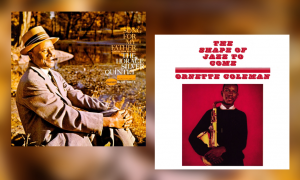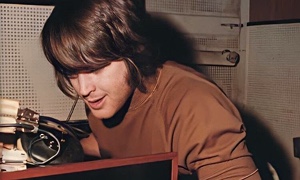Home » Jazz Articles » Building a Jazz Library » John Coltrane: A Liturgical Discography
John Coltrane: A Liturgical Discography
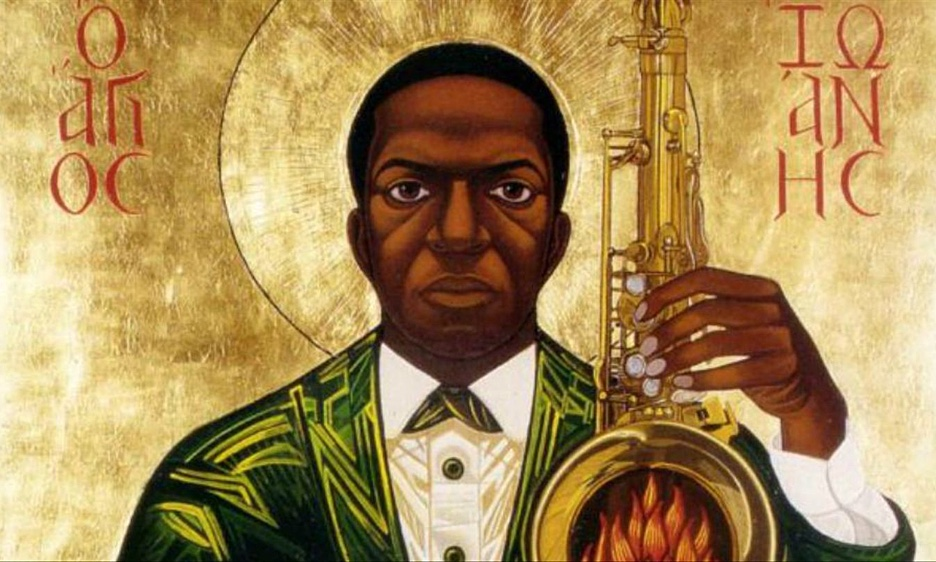
To take the approach here, based on the liturgical calendar used by many Christian traditions, is not meant to evangelize, except maybe for a broad appreciation of Coltrane. Nor does it mean to overburden him. Granted, his public professions of faith in a higher power have affinity with this proposal, as does the recognition of him as a saint by an African Orthodox Church in San Francisco, California.
This discussion wants, instead, to contextualize key moments and recordings and make room for other inviting entry points into the discography. It also wants to embrace a breadth of his recordings (starting with 1955). The church calendar of this article provides a helpful framework to do these things. Consider that certain times and seasons, brief and intense ones, are not easily experienced as the routine and regular. Other times, the routine and regular, sustain people as much if not more. This logic, congruent with that of the calendar followed here, animates this look at Coltrane's music as well.
Advent
 John Coltrane
John ColtraneThe Complete 1961 Village Vanguard Recordings
Impulse!
1997
This four-CD set captures a series of nights by a Coltrane lineup augmented by, among others, the forward-thinking Eric Dolphy (bass clarinet, alto saxophone). Unsettled by the performances, one critic called their music "anti-jazz," and its release by the Impulse! label is part of the reason why it could boast the motto "The New Thing in Jazz." A radical urgency prevalent in much of it resonates especially with Advent 1's apocalypticism, but it is worth four weeks of time each year. The inclusion of "Greensleeves"—a tune associated with Christmas carols—could add to the case for the 1961 Village Vanguard material as Advent music if taking into account those who want to jump ahead to December 25 as soon as Halloween wraps. The single albums "Live" at the Village Vanguard (Impulse! 1962) and Impressions (Impulse! 1963) can suitably introduce listeners without the investment of the larger set, until wanting it all becomes inevitable.
Christmas
 John Coltrane
John Coltrane My Favorite Things
Atlantic
1960; Rhino, 2022
In addition to the title track's common association with the holiday (e.g., "Brown paper packages tied up with strings"), "My Favorite Things" is a bona fide crowd pleaser—wherever, whenever. So take twelve days to bask in the title track—including the signature piano intro of McCoy Tyner and Coltrane's singing soprano saxophone—along with the other three cuts' swinging warmth. The 60th Anniversary Deluxe Edition, with one LP in mono and the other in stereo, would make an ideal present for those with turntables regardless of however many earlier versions they own.
Epiphany
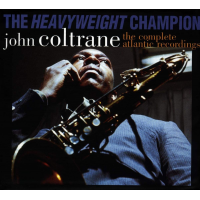 John Coltrane
John ColtraneThe Heavyweight Champion: The Complete Atlantic Recordings
Atlantic
1995
Covering a pivotal two-year period, this set kicks off with material that would comprise Bags & Trane (Atlantic, 1961), a blues-drenched affair with Atlantic labelmate Milt Jackson (vibraphone). While harkening more to his prior work than to where he would go, the pairing with the established veteran —fresh off his own label dates with Ray Charles—shows big jazz's interest in Coltrane's potential star power.
Heavyweight Champion also includes My Favorite Things and Giant Steps (Atlantic, 1960), a watershed moment in the history of the tenor saxophone on account of its title track. That many of its song titles are names of friends and family members makes the album especially sweet. Coltrane and his bands would return to Giant Steps' "Naima," along with "My Favorite Things," for the rest of his career. While well regarded as a sideman and even as a leader up to this point, the Atlantic years are when Coltrane fully came into his own, and Epiphany provides time for it all.
Ash Wednesday
 Thelonious Monk Quartet with John Coltrane
Thelonious Monk Quartet with John Coltrane At Carnegie Hall
Blue Note
2005
When unearthed in 2005, the tape of this 1957 concert grew the known recorded output of Coltrane with Thelonious Monk exponentially. It also received merited and broad recognition as a new classic in the discographies of both artists. As a product of Coltrane's brief residency with Monk, in between tenures with Miles Davis, it is a key artifact of the time and tutelage that changed his playing and jazz forever.
Lent
 Thelonious Monk
Thelonious MonkThe Complete Riverside Recordings
Riverside
1986
Stop playing Coltrane and listen to Monk. For those who think of Lent as a time of self-denial, with some cheating being part of the deal, Coltrane appears on three Monk studio recordings, all products of his fertile association with the Riverside label and its subsidiaries: Monk's Music (Riverside, 1957), Thelonious Monk with John Coltrane (Jazzland, 1961), and Thelonious Himself (Riverside, 1957) for one track.
To travel forty days with Monk also respects approaches to the season that use it to build new awareness and deeper understandings. And to immerse oneself in Monk is to build a relationship with a primary foundation of modern jazz. While this discussion initially highlights the Riverside years, all Monk, from the early Blue Note and Prestige sessions through the later Columbia years and inclusive of one-offs, posthumous releases, and more should be heard eventually. As it rolls around every year, each successive Lent offers a new chance to explore different parts of the Monk discography—if one doesn't already listen to him January through December.
Easter Sunday
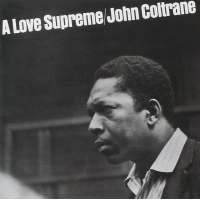 John Coltrane
John Coltrane A Love Supreme
Impulse!
1965
A Love Supreme is a testament to transformation and revitalization. A four-part suite evocative of spiritual conventions ("Acknowledgment," "Resolution," "Pursuance," and "Psalm"), the piece plays like a cathartic thanksgiving. Despite the generous public embrace of the album when released, Coltrane and his classic quartet with McCoy Tyner (piano), Jimmy Garrison (bass), and Elvin Jones (drums) seldom played it live. While artists have covered its material on occasion, the album did not provide any future jazz standards, per se. Intensely personal and passionately played, this cultural touchstone continues to inspire devotion and awe.
Easter Season

John Coltrane
The Classic Quartet: The Complete Impulse! Studio Recordings
Impulse!
1998

John Coltrane
1963: New Directions
Impulse!
2018

John Coltrane
Ascension
Impulse!
1966
Coltrane on Impulse!, a division of ABC at the time, represents the artist at his peak. The box set treatment of his classic quartet's studio work encompasses his bourgeoning cosmic orientation as witnessed on "Out of This World" from Coltrane (Impulse! 1962) and the celestially directed and posthumously released Sun Ship (Impulse! 1971). The collection also includes A Love Supreme and its immediate precursor Crescent (Impulse! 1964), a brooding and bluesy outing that may go best with Holy Saturday, the day cloaked in mystery immediately before Easter Sunday. With barely any overlap, 1963: New Directions (Impulse! 2018) ideally complements the larger set. Inclusive of Coltrane's gorgeous balladry with vocalist Johnny Hartman, the entirety of Live at Birdland (Impulse! 1964), and a thrilling live "My Favorite Things" that points to how far he would go with his signature hit, this three-CD set kind of has it all. The free jazz ensemble album Ascension (Impulse! 1966) not only shares its name with the Thursday forty days into Easter, and ten days before Pentecost, but also fits temperamentally with the season's vividly brilliant readings from Revelation. As with the Monk discography and Lent, each new Easter season provides a chance to dive deep into Coltrane's period of big label resources coupled with epic personal and artistic goals on Impulse! Many fans and collectors consider posthumous releases of concerts from this era on other labels, like those on Pablo, as canonical, too.
Pentecost Sunday
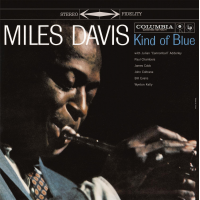 Miles Davis
Miles Davis Kind of Blue
Columbia
1959
As the story goes, Davis came into the Columbia 30th Street Studio with some skeletal charts, and his band—with Coltrane back among the fold and some personnel changes, too—let a certain spirit take over to produce one of the most played jazz albums ever and its all-time greatest seller. A common first jazz album for many, it nevertheless has enduring appeal for those who have relished it for years. Regardless of how many times one has heard it, it deserves at least one day a year of binge listening to discover it all over again.
Pentecost, a.k.a. Ordinary Time

Miles Davis
The Legendary Prestige Quintet Sessions
Prestige
2006

John Coltrane
Fearless Leader
Prestige
2006
 John Coltrane & Friends
John Coltrane & FriendsSideman: Trane's Blue Note Sessions
Blue Note
2014
The longest season of the year provides ample time to luxuriate in the recordings that put Coltrane firmly on the map and on his way to the exalted runs on Atlantic and Impulse!
For almost five years I woke up to "Airegin" from Cookin' with the Miles Davis Quintet (Prestige, 1957) as my alarm. While not yet the titan he would become, the time with Davis—initially in the group known to history as the First Great Quintet with Davis (trumpet), Coltrane (tenor saxophone), Red Garland (piano), Paul Chambers (bass) and Philly Joe Jones (drums)—makes an ideal introduction to Coltrane as a player and to mid-1950s jazz. While many rank Blue Train (Blue Note, 1958), his only leader date on the storied Blue Note label, as a highpoint before his time with Monk and the later Atlantic years, leader dates on the Prestige label, including Soultrane (Prestige, 1958) and Lush Life (Prestige, 1961), have their own significance. While album art should not dictate critical evaluation, the Blue Train cover is iconic, which may account, in part, for consideration of it relative to the Prestige output. Whatever the case, Coltrane's time with Davis on Prestige and Columbia and his work as a sideman, leader and co-leader primarily for Blue Note and Prestige are essential listening for any jazz fan. The three collections used as illustrations here only begin to tell the story of this period. For those brand-new to Coltrane, recordings from his last tour with Davis in 1960, on a variety of labels before any "official" release as The Final Tour: The Bootleg Series, Vol. 6 (Columbia, 2018), anticipate the explosive energy of the 1961 Village Vanguard shows.
Before I had ever heard his music, the song "John Coltrane Stereo Blues" by The Dream Syndicate (Medicine Show; A&M, 1984) made me, an impressionable high school kid, think Coltrane must epitomize late night, laid-back, swinging and bluesy 1950's jazz joints. A potent mix, for sure. Pentecost/Ordinary Time Coltrane has tons that hit that sweet spot. Enjoy it all.
Tags
Building a Jazz Library
Steve Cook
John Coltrane
Eric Dolphy
McCoy Tyner
Milt Jackson
Ray Charles
Thelonious Monk
Miles Davis
Jimmy Garrison
Elvin Jones
Johnny Hartman
Red Garland
Paul Chambers
Philly Joe Jones
PREVIOUS / NEXT
Support All About Jazz
 All About Jazz has been a pillar of jazz since 1995, championing it as an art form and, more importantly, supporting the musicians who make it. Our enduring commitment has made "AAJ" one of the most culturally important websites of its kind, read by hundreds of thousands of fans, musicians and industry figures every month.
All About Jazz has been a pillar of jazz since 1995, championing it as an art form and, more importantly, supporting the musicians who make it. Our enduring commitment has made "AAJ" one of the most culturally important websites of its kind, read by hundreds of thousands of fans, musicians and industry figures every month.










